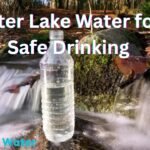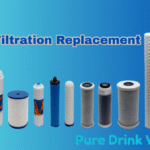Discover the differences between Boiled vs Distilled Water when it comes to freezing. Find out which method yields the clearest ice and why.
When making clear ice cubes, the type of water you choose significantly impacts the outcome. Commonly debated are the benefits of Boiled vs Distilled Water. This article explores the science behind both methods and aims to determine which one truly freezes clearly.
Boiled vs Distilled Water
Table Of Contents
The Science Of Ice Clarity
Various factors, including the presence of impurities and air bubbles in water influence ice clarity. When water freezes, these impurities can become trapped within the ice, leading to a cloudy appearance. Understanding these factors is essential for anyone looking to create crystal-clear ice for cocktails or special occasions.

Boiled Water
Boiling water helps in reducing certain dissolved gases and impurities, which can result in slightly clearer ice. However, it’s important to understand that boiling does not eliminate all types of impurities. As water freezes, air bubbles that are trapped during the freezing process can still cause cloudiness.
If you want to know Bottled Water vs Home Filtration: Which is The Best Option for Drinking Pure Water read this article for more information Bottled Water vs Home Filtration: Which is The Best Option for Drinking Pure Water
1. How To Freeze Boiled Water For Clear Ice:
- Boil the water twice: This technique can help expel more dissolved gases, making it a better candidate for clarity.
- Cool before freezing: Allow the boiled water to cool to room temperature to avoid trapping additional air bubbles.
- Slow freezing methods: Using an insulated container or cooler allows the water to freeze more evenly, minimizing rapid cooling that leads to trapped air.
Distilled Water
Distilled water is produced by boiling water and condensing the steam, effectively removing most impurities and minerals. As a result, distilled water typically freezes into clearer ice cubes than boiled water due to its higher purity level.
Why Distilled Water Freezes Clearer:
- Fewer impurities: With nearly all contaminants removed, distilled water poses less risk of cloudiness in ice.
- Directional freezing: This technique encourages slow and even freezing, further enhancing clarity. Specialized ice molds can help achieve this effect by allowing impurities to settle at the bottom while the top freezes first.
Comparing The Two
While both Boiled vs Distilled Water can produce clearer ice compared to tap water, distilled water is generally superior in achieving clear ice cubes. Boiling water can help improve clarity, but using distilled water combined with the right freezing methods will yield the best results.

Tips For Achieving Clear Ice
- Use Purified Water: Start with the purest water possible, such as distilled water, to minimize impurities.
- Employ Slow Freezing: Consider using a cooler or insulated container to allow for gradual freezing, which promotes clear ice formation.
- Experiment with Ice Molds: Specialized ice molds designed for clarity can significantly improve the appearance of your ice cubes.
Key Takeaways
- Boiled water can reduce some impurities but may still yield cloudy ice.
- Distilled water is cleaner and generally freezes into clearer ice than boiled water.
- Proper freezing techniques are crucial for achieving the best ice clarity.
Conclusion
In the comparison of boiled vs distilled water, distilled water emerges as the clear winner for producing the best quality ice. However, if you choose to use boiled water, applying proper techniques can still result in decent clarity. Whether you’re preparing drinks for a gathering or simply want to enhance the aesthetic of your beverages, understanding the properties of the water you use can make all the difference.
If you have any ideas or questions about Boiled vs Distilled Water please let us know, We’re on Facebook, Instagram, and Twitter too! If you want to stay connected with us, be sure to follow us.
Q&A
1. Is boiled water the same as distilled water?
No, they are not the same. Boiled water is heated to kill pathogens but retains minerals and impurities, while distilled water is purified through boiling and condensing steam, effectively removing almost all impurities.
2. Does boiling water make ice clearer?
Boiling water can help produce clearer ice compared to tap water by expelling some dissolved gases. However, distilled water typically freezes clearer because it lacks minerals and impurities altogether.
3. What is the best method for making clear ice?
The best method involves using distilled water and freezing it slowly. Techniques like directional freezing, where water freezes from the top down, can help minimize air bubbles and impurities, resulting in clearer ice.
4. How long should I boil water to ensure it’s safe?
To ensure safety, water should be boiled for at least one minute at a rolling boil. This process is effective for killing bacteria and viruses but does not purify the water completely.
5. Can I drink distilled water every day?
Yes, distilled water is safe to drink, but its lack of minerals may not make it the best choice for everyday hydration. Long-term reliance on distilled water might require mineral supplementation from other sources.
6. What are the health implications of consuming boiled vs. distilled water?
Drinking boiled water can retain beneficial minerals, making it good for health. Distilled water is free from contaminants and is recommended for those with weak immune systems, but long-term consumption may lead to mineral deficiencies.





